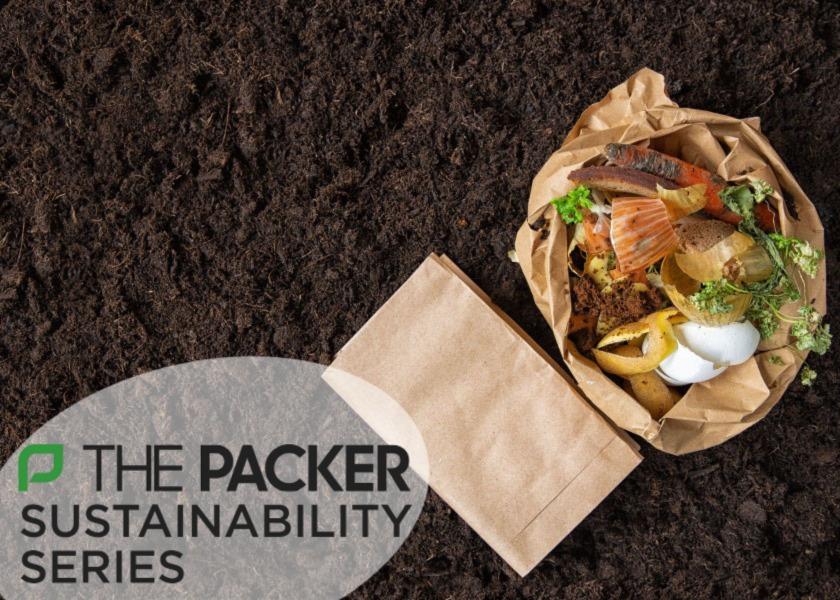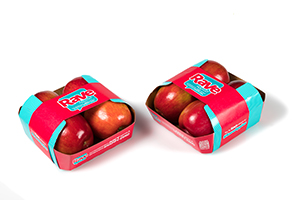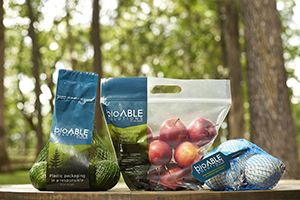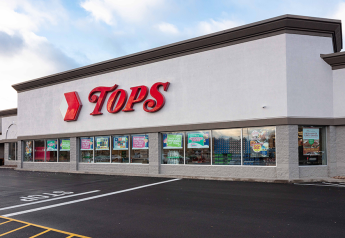Retailers, food tech, farmers get creative to reduce waste and improve packaging

While sustainability is a rapidly evolving industry, constantly refining what it means to reduce environmental impacts across sectors, according to The Packer’s 2022 Sustainability Insights Survey, close to 70% of consumers identified climate change as extremely or very important to their overall sustainability priorities.
The Packer met with growers, retailers and innovators across the fresh produce supply chain to learn what sustainability looked like on their farm, ranch, grocery aisle and laboratory. Inventive and practical, many producers, retailers and organizations are actively reducing their carbon footprint in their supply chains, focusing on priorities such as:
- Improving soil health;
- Emphasizing integrated pest management;
- Conserving water;
- Adopting packaging innovations;
- Reducing food waste; and
- Improving supply chain traceability.
Part one of our Sustainability Series spotlights what growers and chemists are doing to improve soil health and part two examines strategies growers are pioneering to reduce impact through conserving water and integrated pest management. In the third installment of The Packer’s Sustainability Series, learn more about what growers, retailers and innovators they are doing to improve product packaging and reduce food waste.
Improving packaging
Once produce is harvested, the material housing the perishable, often delicate fruit or vegetable — product packaging — is yet another place in the product lifecycle from seed to plate where the carbon footprint can grow.
According to the Fibre Box Association, a group representing North American manufacturers of corrugated packaging, “one of the easiest ways to communicate a commitment to the shared values of the consumer is through packaging that is truly sustainable. Many of our member companies are being asked to look at how they can replace other forms of packaging with more sustainable, paper-based [corrugated] packaging,” said Rachel Kenyon, senior vice president.
Added to this, the way that shoppers receive groceries is rapidly changing. “I think changes in the supply chain will continue to impact food-tech and packaging in the years to come,” said Kenyon. “With more home delivery will come a greater need to ensure freshness in products, maintain a cold chain and a whole host of things we probably haven’t thought of yet.”
FBA is working together with companies all having a common interest in the issues, trends, technical challenges and overall well-being of the corrugated industry. According to Kenyon, one exciting project is improving how corrugated boxes are made and working toward reducing the impact of boxes on the environment.
“Every four years, since the first-ever life cycle assessment of a corrugated box in 2006, we have measured the impact of boxes on the environment. We are currently conducting the fourth study, with data expected early next year. The studies are part of the industry’s continuous improvement process,” said Kenyon. “A circular economy is one that uses a systems-focused approach and involves industrial processes that are restorative or regenerative by design, enables resources and activities to maintain their highest value for as long as possible, and aims for waste elimination.
“Corrugated boxes are made from both new fibers and recycled fibers,” Kenyon continued. “Maintaining this balance of fiber use is a key to the circular nature of boxes — from forest to the recycling bin and back, corrugated boxes epitomize the circular economy principle.”

On the producer side, both Stemilt and Consalo Family Farms have incorporated recyclable paper packaging as a step toward more sustainable packaging. Stemilt is trialing a paperboard apple four-pack dubbed EZ Band. And Consalo Family Farms is trialing paper board trays for its blueberries. The main concern is that this paper packaging “doesn’t affect product quality.”
“I want the berries to be protected, both in storage, cooling, transit and, ultimately, on the grocery store shelves,” Chelsea Consalo, executive vice president of Consalo Family Farms, said.
Packaging supplier Sev-Rend doesn’t view paper as the only option. “We are seeing some major trends towards adding paper products into the mix, but you run into issues such as food waste increasing or items not being eligible for the recycle stream since you now have a paper/plastic hybrid product,” said Jeff Watkins, director of marketing at Sev-Rend.
“The real solution right now is twofold,” continues Watkins. “One: We need to develop our recycling infrastructure, so it is more widely available to the consumer, along with being dynamic to handle more single-use plastic items. Two: We also need to drive incentive for the brand owners to invest into more sustainable packaging options that truly work. Right now, we see options that are three to five times more expensive for the brand owners, and that is a huge turn-off for many to fully commit. If we see incentives from the legislative side, this may be what gets brand owners to commit to more sustainable packaging options for the fresh produce industry.”

In the meantime, Sev-Rend offers a packaging line like its bestsellers but made with “engineered substrate that is designed to be recyclable in the first 18 months of its life and then degrade rapidly in the last portions of its life, leaving behind no microplastics.”
“This helps to give the market options, as we see many areas do not have the infrastructure in place yet to recycle single-use plastics,” Watkins said. “These items are also drop-in ready on a majority of popular industry packaging equipment, which helps to reduce our clients needing to commit to large capital investments on new machinery.”
Reducing food waste
While suppliers are finding more sustainable ways to package fresh produce, a handful of producers and retailers are brainstorming ways to reduce food waste entirely. Retailer ALDI believes minimizing food waste, along with reducing plastic and packaging is top-of-mind for consumers.
“Reducing food waste has long been a priority for Aldi and we know it’s an increasingly important topic to our shoppers. In fact, in a 2021 survey we commissioned we found that 70% of Aldi shoppers take sustainability into consideration when grocery shopping. Previous insights we’ve gathered show that food waste specifically, along with plastic and packaging reduction, are among the most important sustainability topics to our shopper,” said Joan Kavanaugh, vice president of national buying.
Mark Pins, director of marketing at State Garden, saw an opportunity in his operation. State Garden “washes and packs over a million pounds of spinach, lettuce and celery,” according to Pins. “If it has tip burn or is leggy, people are not going to buy it, even if it’s wholesome and fine.”
Pins wanted to “put every leaf of lettuce to good use” at State Garden. He brainstormed and bought an industrial juicer. His goal? To develop fresh juices that upcycle what would have been leafy greens sold to a feedlot. Pins launched his experiment with a Yeti cooler full of juice, wheeled into State Garden’s headquarters. He solicited co-workers for taste-testing and feedback.
“We knew we had something,” said Pins. State Garden upped the ante and hired a juice mixologist to help the company scale. Today, the producer now offers five flavors of juice with upcycled greens in 750 stores.
As the produce is transported to the consumers, there are even more opportunities to reduce waste. Innovations in shelf-life extension are hitting the market daily. Some products, like the Hazel 100, chemically alter the decaying process on a wide range of produce.
“The Hazel 100 is a packet about half the size of a sugar packet, which, once thrown into a box or bin of produce [by a grower or packer], begins releasing its own gas, an active ingredient called 1-MCP, that neutralizes the negative effects of ethylene,” said Pat Flynn, the chief marketing officer at Hazel Technologies, the developer of Hazel 100. “Whether for apples or the 15-plus other commodities Hazel 100 has been tailored to treat, the result is the same: more resilient fruit and vegetables that stay fresher and more sellable for a longer period of time.”
According to Flynn, the Hazel 100 “is technically called a ‘shelf-life extension technology,’ which means that it helps fresh fruit and vegetables stay as fresh as possible until well after [they reach] the store shelf. The longer a piece of produce is at peak ripeness, the higher likelihood that it will be sold and consumed. Hazel products reduce food waste by creating more time for fresh produce to be moved, sold and consumed.
“The saying ‘One bad apple spoils the bunch’ obviously has a double meaning, and I think fewer people are familiar with the scientific side of it,” continued Flynn. “Well, when an apple is punctured or badly bruised, it starts to decompose prematurely and, in doing so, releases a natural, damaging gas called ethylene that, once absorbed by the other, healthy apples around it, initiates a chemical reaction that tells those perfectly healthy apples that they should begin decomposing prematurely.”







